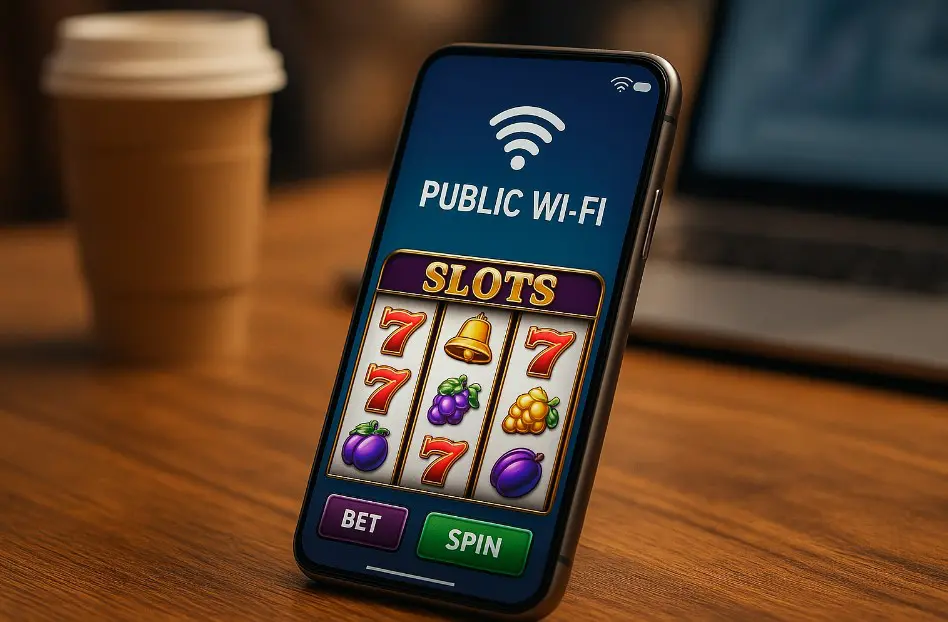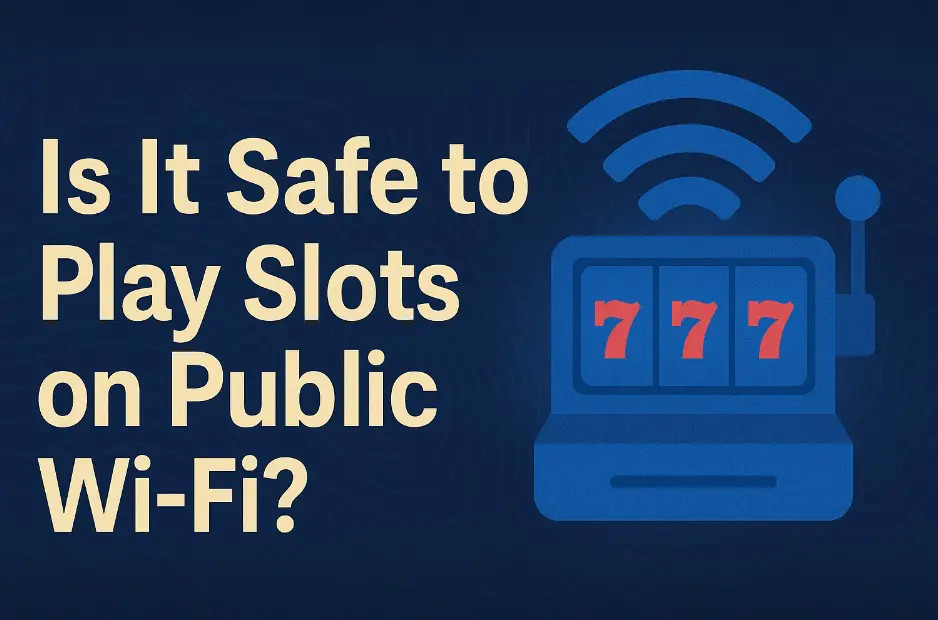You know that moment when you’re at the airport, you’ve got an hour before boarding, and your brain goes, “Just one quick spin…”? Yeah, we’ve all been there. The reels start rolling, the Wi-Fi feels solid, and then a thought sneaks in: Wait… is this safe?
Public Wi-Fi seems harmless enough — free internet, no questions asked — but for slot players, it can be like sitting at a table where someone’s quietly looking over your shoulder. And not just to admire your luck.
Let’s talk about what’s really going on behind that “Free Wi-Fi” sign and how to keep your casino play safe without turning into a paranoid tech nerd.
Why Public Wi-Fi Feels Sketchier Than It Looks
Here’s the thing: public Wi-Fi isn’t evil — it’s just lazy. It’s built for convenience, not security. When you connect at a café or airport, your phone’s basically joining a big, unguarded party where everyone’s data floats around freely.
Most of these networks are unencrypted, which is tech-speak for “anyone nearby could snoop if they felt like it.” It’s like sitting at a blackjack table and whispering your strategy loud enough for everyone to hear.
When you open your casino app, log in, and start playing, your phone sends little bits of info — login data, payment tokens, game actions — through that open network. Without protection, that info can be grabbed mid-air. No pop-up warning, no alarm. Just a silent, invisible leak.
I once connected to hotel Wi-Fi in Barcelona, opened a poker app, and immediately got kicked out for “suspicious activity.” Spoiler: the app was right. I was on an unsecured network that had been flagged for fake routers. Lesson learned: the house isn’t the only one that can take your money.
The Sneaky Stuff Lurking on Public Networks
When you’re gambling online, the villains aren’t movie hackers in dark hoodies — they’re scripts, bots, and data thieves who love public Wi-Fi.
One classic trick? The man-in-the-middle attack. Picture this: you send your login info to your casino, but someone slides in between, copies it, and then passes it along. You never know. Everything still looks normal. It’s a cyber pickpocket with good manners.
Then there’s phishing on Wi-Fi — fake casino pages that look pixel-perfect until you realize (too late) the URL’s off by one letter. And let’s not forget malware, which can quietly install itself the moment you connect. Once it’s in, it snoops, logs keystrokes, or even hijacks your casino sessions.
And yes, all this can happen while you’re just sitting there ordering your cappuccino.
The Man-in-the-Middle Trick, Plain and Simple
Here’s how that sneaky middleman works. You connect to “Free_Airport_WiFi,” thinking you’re safe. Turns out, it’s a fake access point set up by someone in the same terminal. Every packet of data — every spin, every login — flows through their laptop first.
It’s like sending a postcard through someone else’s mailbox. Sure, it’ll get delivered, but they can read it first if they want.
Sometimes, even real networks get compromised. That’s where session hijacking comes in. The hacker steals your active login session and keeps using your casino account long after you’ve closed the app. A friend of mine once found her account balance wiped an hour after playing at a coffee shop. She hadn’t even logged in again.
Fake Hotspots and Malware That Hitch a Ride
If you’ve ever scrolled through a list of networks and seen five versions of “Starbucks_WiFi_Free,” that’s your sign something’s off. Fake Wi-Fi hotspots mimic real ones, waiting for you to connect. Once you do, they can install malware or reroute your traffic to phishing sites.
And malware’s sneaky. It won’t crash your phone; it’ll just hang out quietly, recording data or copying saved payment details from your casino app. It’s like having an invisible casino partner who takes a cut of your wins — and your personal info.
I made the mistake of connecting to a “hotel_guest_WiFi_2” once. Worked fine. Smooth connection. But a week later, I started getting random password reset emails from my casino app. Coincidence? Probably not.
When Data Becomes Bait: Interception and Identity Theft
Think of your phone as a loud talker. Every time it “talks” to a casino server, bits of information — your email, device ID, payment attempts — are part of that chatter. On a public network, someone can eavesdrop, grab chunks of that data, and piece together your identity later.
Sometimes they don’t even want your money. They want your data trail. Hackers collect fragments from multiple users, mash them together, and sell them on the dark web. And yes, that’s a real thing — even mid-sized casino players are on those lists.
I’ve seen gamblers lose not just their winnings but access to email accounts linked to casinos. It’s a nightmare chain reaction.
Why a VPN Is Your Digital Seatbelt
If you’re serious about slot gaming (and not just the free demos), a VPN should be non-negotiable. Think of it as your private tunnel through all that noisy Wi-Fi traffic. It encrypts everything, making your connection unreadable even if someone’s watching.
I once played Thunderstruck II at an airport using a premium VPN — smooth as butter. Tried it once without? Halfway through a bonus round, the connection glitched, and I got a “session error.” That was my wake-up call.
A decent VPN (not the free kind that sells your data) can protect you with AES-256 encryption — basically military-level scrambling. Just make sure to keep it on the entire time you’re connected. Dropping the VPN mid-spin is like locking your door and leaving the window open.
Safer Payments and Smarter Logins
Rule number one: never punch your card details into a casino app while you’re sipping coffee on public Wi-Fi. Even with encryption, it’s risky. Instead, use secure payment gateways like PayPal or Apple Pay — they add extra encryption layers and don’t reveal your actual card details.
And please, enable two-factor authentication. Yes, it’s annoying to wait for that little code, but it’s like adding a deadbolt on your casino account. I once skipped 2FA out of laziness and ended up having to email support to recover my account. Lesson learned.
Many casinos now support biometric logins — face or fingerprint — which keeps your credentials off the keyboard entirely. It’s fast, secure, and very James Bond.
Keeping Your Device Tight and Secure
Network safety means nothing if your phone’s as open as a bar tab. Keep your OS updated — not because you love tech, but because those updates patch real holes hackers exploit.
Here’s a quick mental checklist:
- Download casino apps only from official stores — no shady APKs promising “unlimited spins.”
- Turn off auto-connect for Wi-Fi networks.
- Use a password manager instead of reusing your go-to “Lucky777.”
- Clear your cookies and cache often (they’re data magnets).
- Never install “Wi-Fi boosters” or “casino helper” apps — those are usually traps.
It’s not glamorous advice, but hey, neither is changing your car’s oil, and you still do it.
Spotting a Fake Network Before It Catches You

When you open your Wi-Fi list and see multiple lookalikes, trust your gut. Ask staff for the official name before connecting. If a network asks you to install anything or “accept a certificate,” disconnect immediately. That’s hacker for “please let me in.”
Some phones flash a tiny warning saying “Network not secure.” Don’t ignore it like a low-fuel light. It’s your device gently whispering, “Don’t do it, mate.”
What to Avoid While You’re Connected
Let’s be real: sometimes you’ll still connect. Maybe you’re stuck somewhere with no data and boredom wins. Fine. But there are a few hard rules that’ll keep you safe:
- Don’t make payments or withdrawals — ever.
- Avoid logging into more than one gambling account.
- Log out right after you’re done.
- Turn off Wi-Fi when you finish (seriously, do it).
- If you can, play in demo mode. Scratch the itch, no risk attached.
Your 4G or 5G network is a lot safer anyway. It’s encrypted by design and less prone to eavesdropping.
Red Flags While Playing
You’ll sometimes feel when something’s off — slow spins, redirect screens, or login requests that seem weirdly timed. Trust those instincts. A compromised network often causes subtle glitches.
Double-check the URL if you’re playing through a browser, and make sure the padlock icon’s still there. If it disappears or shows “Not Secure,” bail out immediately.
And if a pop-up suddenly asks for your payment info “to verify identity”? Nope. Casinos don’t do that mid-session. That’s a hacker with stage fright.
The Weird Psychology Behind Taking Wi-Fi Risks
Here’s an odd truth: gamblers tend to underestimate digital risk because we’re already comfortable with chance. We tell ourselves, “What’s the worst that can happen?” while spinning reels worth real cash on networks held together by coffee fumes.
It’s not recklessness, just habit. The same dopamine rush that makes a slot exciting also makes risk feel smaller. Add the boredom of travel or waiting rooms, and suddenly “just one spin” on public Wi-Fi sounds harmless.
The trick is not to stop playing — it’s to play smarter. Treat every public connection like a temporary rental car: use it, but don’t store anything valuable inside.
Why It All Matters
Losing a jackpot stings. Losing your identity? That’s a whole new level of pain. Once someone’s got your login or card data, they can drain accounts, open fake casino profiles, or even scam you later through phishing emails.
Casinos spend millions on encryption and secure servers, but none of that helps if the weak point is your device. Protecting your connection is like bringing your own seatbelt — the casino can’t do it for you.
FAQs About Slot Safety on Public Networks
Can I use public Wi-Fi with a VPN?
Sure — as long as it’s a trusted VPN and you keep it connected the whole time. If it disconnects mid-spin, you’re briefly exposed.
Is mobile data safer than Wi-Fi?
Yes, by a mile. 4G and 5G use strong encryption, so stick to those if you can.
How do I know my casino app’s legit?
Check that it’s from the official store and matches the casino’s site exactly. Watch for copycat developers.
What if I’ve already used public Wi-Fi to gamble?
Change your passwords now. Then check your casino’s security settings — enable 2FA and review recent login history.
What should I do if I suspect a hack?
Contact casino support right away, freeze any linked payment accounts, and run a malware scan on your device.


